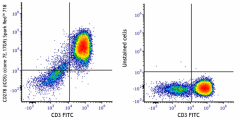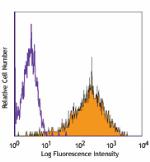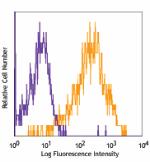- Clone
- 7E.17G9 (See other available formats)
- Regulatory Status
- RUO
- Other Names
- Inducible COStimulatory molecule, H4
- Isotype
- Rat IgG2b, κ
- Ave. Rating
- Submit a Review

| Cat # | Size | Price | Quantity Check Availability | Save | ||
|---|---|---|---|---|---|---|
| 117427 | 25 µg | £66 | ||||
| 117428 | 100 µg | £161 | ||||
The 7E.17G9 antibody reacts with the 47-57 kD ICOS protein, also known as inducible costimulatory molecule, and H4. This protein is homologous to the CD28/CTLA-4 proteins. ICOS is expressed on activated T cells and a subset of thymocytes and can costimulate T cells and induce proliferation. In addition ICOS has been shown to be involved in humoral immune responses (B cell germinal center formation). The ICOS ligand, B7h/B7RP-1 and B7-H2 is constitutively expressed in B cell areas of secondary lymphoid organs and can be induced in other tissues by LPS. ICOS stimulation has been shown to potentiate TCR-mediated IL-4 and IL-10 production and has been proposed to play a role in Th2 cell development. ICOS stimulation has been shown to be involved in airway tolerance and the downregulation of pulmonary inflammation.
Product DetailsProduct Details
- Verified Reactivity
- Mouse
- Antibody Type
- Monoclonal
- Host Species
- Rat
- Immunogen
- Mouse ICOS cDNA and ICOS hexahistidine fusion protein
- Formulation
- Phosphate-buffered solution, pH 7.2, containing 0.09% sodium azide
- Preparation
- The antibody was purified by affinity chromatography and conjugated with Spark Red™ 718 under optimal conditions.
- Concentration
- 0.5 mg/mL
- Storage & Handling
- The antibody solution should be stored undiluted between 2°C and 8°C, and protected from prolonged exposure to light. Do not freeze.
- Application
-
FC - Quality tested
- Recommended Usage
-
Each lot of this antibody is quality control tested by immunofluorescent staining with flow cytometric analysis. For flow cytometric staining, the suggested use of this reagent is ≤ 1.0 µg per million cells in 100 µL volume. It is recommended that the reagent be titrated for optimal performance for each application.
* Spark Red™ 718 has a maximum excitation of 697 nm and a maximum emission of 711 nm. - Excitation Laser
-
Red Laser (633 nm)
- Application Notes
-
Additional reported applications (for the relevant formats) include: blocking of ligand binding. The LEAF™ format is suggested for blocking studies.
-
Application References
(PubMed link indicates BioLegend citation) -
- Akbari O, et al. 2002. Nat. Med. 8:1024.
- Harada H, et al. 2003. J. Clin. Invest. 112:234.
- McAdam AJ, et al. 2000. J. Immunol. 165:5035. (FC Block)
- Tan SL, et al. 2006. J. Immunol. 176:2872. PubMed
- RRID
-
AB_3068034 (BioLegend Cat. No. 117427)
AB_3068034 (BioLegend Cat. No. 117428)
Antigen Details
- Structure
- CD28/CTLA-4, 47-57kD
- Distribution
-
Activated T cells, subset of thymocytes
- Function
- Costimulates T cell activation, proliferation, humoral immune response
- Ligand/Receptor
- B7h/B7RP-1/GL-50
- Cell Type
- T cells, Thymocytes
- Biology Area
- Costimulatory Molecules, Immunology
- Molecular Family
- CD Molecules
- Antigen References
-
1. Rudd CE, et al. 2003. Nat. Rev. Immunol. 3:544.
2. McAdam AJ, et al. 2000. J. Immunol. 165:5035.
3. Mak TW, et al. 2003. Nat. Immunol. 4:765 - Gene ID
- 54167 View all products for this Gene ID
- UniProt
- View information about CD278 on UniProt.org
Related FAQs
Other Formats
View All CD278 Reagents Request Custom Conjugation| Description | Clone | Applications |
|---|---|---|
| Biotin anti-mouse CD278 (ICOS) | 7E.17G9 | FC |
| PE anti-mouse CD278 (ICOS) | 7E.17G9 | FC |
| TotalSeq™-A0847 anti-mouse CD278 (ICOS) | 7E.17G9 | PG |
| TotalSeq™-C0847 anti-mouse CD278 (ICOS) | 7E.17G9 | PG |
| Ultra-LEAF™ Purified anti-mouse CD278 (ICOS) | 7E.17G9 | FC,Block |
| PE/Cyanine7 anti-mouse CD278 (ICOS) | 7E.17G9 | FC |
| PerCP/Cyanine5.5 anti-mouse CD278 (ICOS) | 7E.17G9 | FC |
| APC anti-mouse CD278 (ICOS) | 7E.17G9 | FC |
| TotalSeq™-B0847 anti-mouse CD278 (ICOS) | 7E.17G9 | PG |
| Spark Red™ 718 anti-mouse CD278 (ICOS) | 7E.17G9 | FC |
| Brilliant Violet 421™ anti-mouse CD278 (ICOS) | 7E.17G9 | FC |
| Brilliant Violet 711™ anti-mouse CD278 (ICOS) | 7E.17G9 | FC |
Compare Data Across All Formats
This data display is provided for general comparisons between formats.
Your actual data may vary due to variations in samples, target cells, instruments and their settings, staining conditions, and other factors.
If you need assistance with selecting the best format contact our expert technical support team.
-
Biotin anti-mouse CD278 (ICOS)

Con A-stimulated (3 days) Balb/c splenocytes stained with bi... -
PE anti-mouse CD278 (ICOS)

Con A-stimulated (3 days) C57BL/6 splenocytes stained with 7... -
TotalSeq™-A0847 anti-mouse CD278 (ICOS)
-
TotalSeq™-C0847 anti-mouse CD278 (ICOS)
-
Ultra-LEAF™ Purified anti-mouse CD278 (ICOS)
-
PE/Cyanine7 anti-mouse CD278 (ICOS)

ConA-stimulated (3 days) C57BL/6 splenocytes were stained wi... -
PerCP/Cyanine5.5 anti-mouse CD278 (ICOS)

ConA-stimulated (3 days) C57BL/6 splenocytes were stained wi... -
APC anti-mouse CD278 (ICOS)

ConA-stimulated (3 days) C57BL/6 splenocytes were stained wi... -
TotalSeq™-B0847 anti-mouse CD278 (ICOS)
-
Spark Red™ 718 anti-mouse CD278 (ICOS)

ConA-stimulated (3 days) BALB/c splenocytes were stained wit... -
Brilliant Violet 421™ anti-mouse CD278 (ICOS)

ConA-stimulated (3 days) C57BL/6 splenocytes were stained wi... -
Brilliant Violet 711™ anti-mouse CD278 (ICOS)

ConA-stimulated (3 days) C57BL/6 splenocytes were stained wi...

 Login / Register
Login / Register 
















Follow Us